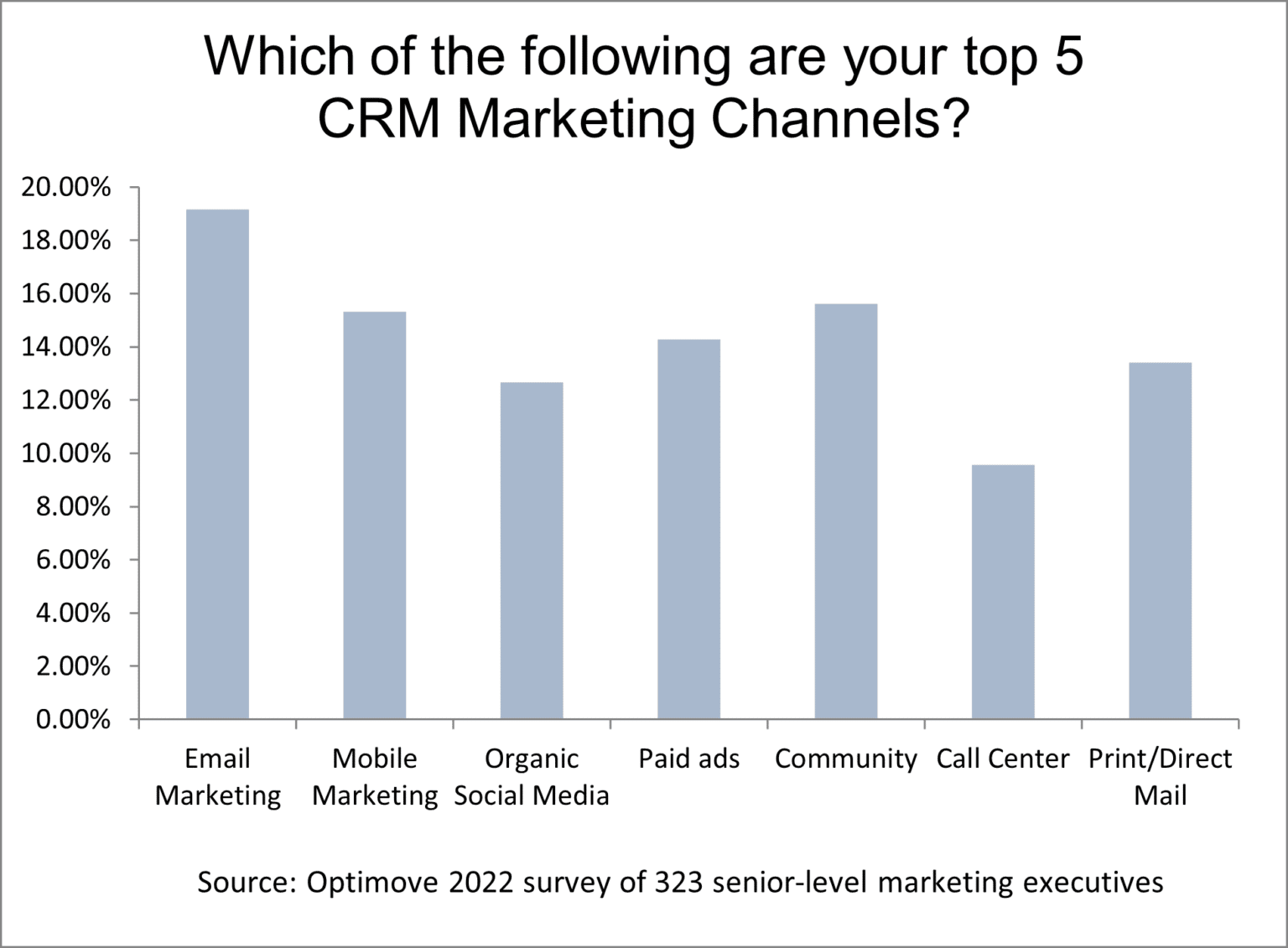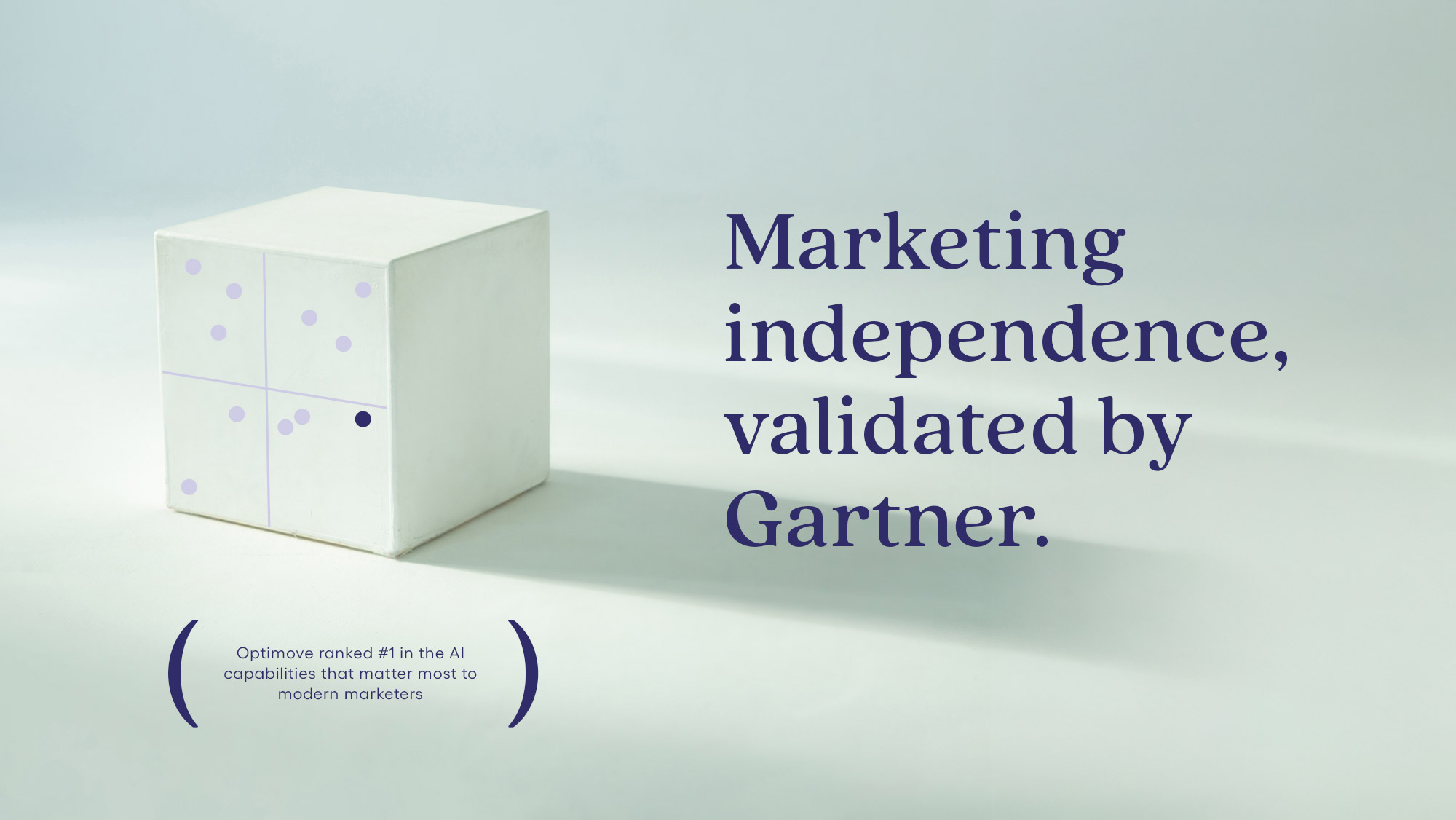
AI and the Retail Marketer’s Future
How AI transforms strategy and processes, driving the adoption of Positionless Marketing
Optimove Connect 2026: Join us in London on March 11–12 to master Positionless Marketing
Forrester: Optimove’s Total Economic Impact
Customer relationship management (CRM) marketing is a term referring to the strategies and tactics, as well as to the technologies supporting the execution of said strategies and tactics, marketers use in order to manage the relationship with their customers throughout the customer lifecycle. The goal of CRM marketing is to improve and optimize customer relationships, in order to drive customer loyalty, retention, revenue and customer lifetime value.
A CRM system, or CRM software, is designed to manage a company’s relationships and interactions with both existing and potential customers. It centralizes customer information, automates marketing efforts, and facilitates communication. CRM platforms integrate various functions, such as sales and marketing, to provide a unified view of customer data for more personalized and efficient customer marketing.
CRM systems use customer data to create targeted and relevant marketing campaigns to enhance customer engagement and retention through personalized experiences. Effective customer relationship management in marketing focuses on understanding customer needs and preferences, helping craft strategies that boost customer satisfaction and loyalty. Businesses can make data-driven decisions that foster long-term customer relationships by leveraging CRM systems.
A CRM marketing strategy uses customer data to create personalized marketing campaigns. It aims to improve customer engagement, retention, and loyalty. Effective strategies include retention, digital, email, omnichannel, and lifecycle marketing. For example, customer-led marketing is an effective CRM Marketing strategy proven to increase Customer Lifetime Value by 33% on average.
For example, a CRM retention strategy focuses on keeping existing customers engaged and active through marketing campaigns according to customers’ lifecycles and segmentation. A brand can send out a specific marketing message to a group of users they analyzed who have similar customer purchase histories and product preferences. Based on this data, the company can deliver personalized offers, loyalty rewards, and targeted messages to encourage repeat purchases. This way, brands can increase customer retention and lifetime value by continuously engaging customers with relevant promotional campaigns and offers.
CRM Marketing channels are the vehicles CRM marketers use to deliver their messages to their audience. Marketing channels are a significant part of any CRM Marketing solution. They are the arm that carries out the strategy defined by the marketer or orchestrated and mapped by the platform’s AI engine.
CRM Marketing platforms collect, analyze, and segment customer data to create, execute, and measure marketing campaigns. Using a CRM Marketing platform, marketers can send out marketing messages, streamline campaign management, track performance, and optimize strategies in real-time.
The types of CRM marketing channels are usually as follows:
In the absence of channels, no communication can take place between a brand and a customer. Brands who set out to implement advanced multichannel CRM Marketing strategies never focus on a single or a couple of channels. These brands hold a wide array of channels at their disposal to ensure they deliver personalized messages to customers using the ideal channel, at the right time, with the right message.

Marketers use CRM Marketing tools to create more effective and personalized campaigns. These tools help marketers understand customer behavior and preferences through data analysis. Marketers can attract specific groups with tailored messages by segmenting customers into the most precise target groups, leading to higher engagement and better customer experiences. These tools enhance customer relationships and drive business growth.
Some examples of CRM Marketing include:
CRM marketing, sometimes called “Relationship Marketing,” helps marketers manage customer relationships, retain them, and build loyalty. Here are some key benefits:
Using CRM Marketing, brands can better understand their customers, create targeted campaigns, and build lasting relationships.
CRM marketing automation describes a set of processes executed by software to automatically respond to customer activities and improve the overall customer relationship with brands. When implemented fully, CRM marketing automation kicks in from the very first interaction a potential customer has with a brand and continues throughout the customer lifecycle. The automated system captures relevant data about every customer and their activities and automatically generates personalized and relevant customer communications. The content of these communications varies according to the nature of the customer, the type of interaction and the stage in the customer journey that the interaction occurred.
CRM marketing automation software should be tailored to suit the specific needs and models of each individual business. Tasks typically attributed to a CRM marketing automation tools include regularly segmenting customers based on their most recent activities and transactions, sending each customer the most relevant information, offers, incentives, etc. via the best channel(s), tracking response to communications and even automatically optimizing future communications (content, timing and channels) based on prior responses.
CRM marketing automation is highly valuable software that enables marketing teams to best manage their communications with large volumes of customers and potential customers, in a strategic manner. Through CRM marketing automation tools, marketers are afforded more time to focus on the creative aspects of their work.
A CRM database is a software platform designed to support a company’s CRM strategy and efforts. Different CRM databases vary in their levels of sophistication, from simply collecting and organizing customer data to performing advanced customer data analysis, customer segmentation and next best action recommendations. CRM databases can include various additional components based on the company’s needs and industry.
Optimove is the world’s leading Relationship Marketing Hub, combining the most advanced CRM marketing technologies with an automated customer marketing orchestration platform. In a nutshell, Optimove is a customer-led marketing platform. It helps marketers implement a systematic approach to planning, executing, measuring and optimizing a complete, highly personalized customer marketing plan. The result is maximized customer retention, loyalty and lifetime value.
Contact us today to request a Web demo and learn how you can use Optimove to convert more customers, increase the spend of existing customers and reduce customer churn.
CRM integration helps businesses better understand their customers, enabling personalized marketing campaigns that can increase customer satisfaction and loyalty. By analyzing customer data, businesses can identify trends, segment customers more effectively, and tailor their marketing efforts to meet different customer groups’ specific needs and preferences. Additionally, CRM tools can automate repetitive tasks, streamline marketing processes, and provide insights into the effectiveness of marketing campaigns, helping businesses allocate resources more efficiently and improve their return on investment
CRM marketing supports customer lifecycle management by tracking and managing customer interactions at each stage, from initial awareness and acquisition through engagement, purchase, and post-purchase support. By leveraging CRM data, marketers can design targeted campaigns that address the needs and interests of customers at each stage, encouraging progress through the lifecycle. CRM tools also facilitate collecting feedback and monitoring customer satisfaction, enabling businesses to identify areas for improvement, foster customer loyalty, and increase the likelihood of repeat business and referrals
CRM marketing enables businesses to analyze customer data comprehensively, including past purchases, interaction history, and engagement levels, to identify high-value customers or those with the potential to become such. By leveraging this data, companies can segment their customer base into various groups based on their value and potential. This segmentation allows for the creation of personalized marketing strategies tailored to effectively engage and retain these high-value customers. For example, businesses might offer exclusive deals or loyalty programs to these segments, along with personalized communications. These efforts enhance customer satisfaction and loyalty, ultimately securing a higher lifetime value from these key customer segments.
Forrester: Optimove’s Total Economic Impact
The Forrester Total Economic Impact™ Study shows that Optimove’s Positionless Marketing Platform drives an 88% boost in campaign efficiency.



